I have been raising a pair of ducks for 2 years now. They eat bugs, grass, and weeds while keeping my property clear. It’s a free service in lieu of some cute honks!
It was very sudden for me to notice one morning that one of my ducks was limping. Since they were my first ducks, I really didn’t know what to do! So, I dug up the root and brought up a solution. Do you know what did I do?
To get the answer, you have to read this article. By the end, you will know in detail why your duck limps (if you face anything similar). Let’s start now, shall we?
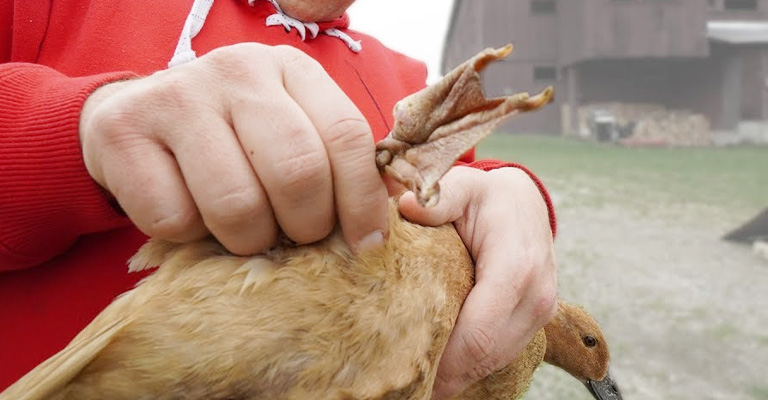
Do You Know?
- Ducks have webbed feet. It acts like paddles.
- They are excellent swimmers and can glide gracefully on water, thanks to their feet.
- They have unique blood circulation in their legs. It helps them regulate temperature, as arteries and veins are close together.
- The legs are rich in nerve, and they are very sensitive.
- They also have special leg bones. It supports them while swimming, flying, and walking.
- It’s amazing how Ducks can adjust the blood flow to their legs with warm legs in cold water and cool in warm weather.
- The waddling is quite distinctive. Ducts often waddle while walking with short legs and a wide body.
- The legs are covered with scales, something like reptiles. It protects the legs and feet.
Why Is My Duck Limping?
Do you know, limping can be a serious issue in ducks? No matter how special the legs seem, they are structurally weak compared to the body weight.
It is important to point out the common foot issue before it gets too serious and poorly affects your ducks. Sometimes, we may not know, but the limping legs can indicate a hidden health issue or injury.
Ducks can limp for a number of reasons. Let’s talk it out and be prepared beforehand.
1) Ducks Got Hurt
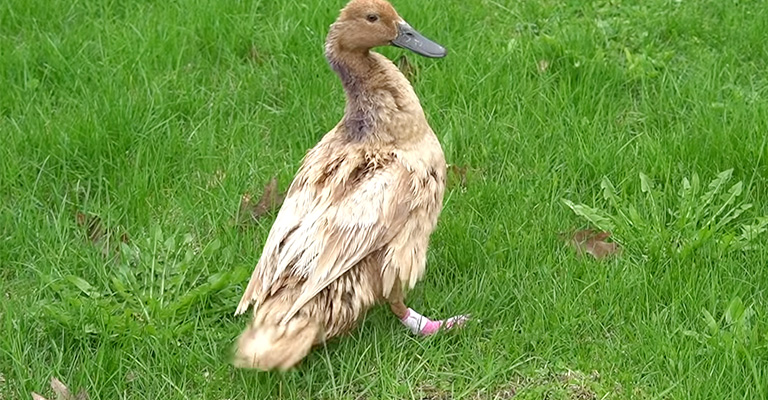
One of the most common reasons for a duck to limp is, that they got hurt and suffered from an injury. It mostly happens with the ducklings. Many people brood the ducklings on the wire.
They can have small strings stuck on the hocks. If not removed on time, the hock gradually swells and the duck will end up with a limping leg. Hence, it is advised that you brood the ducks in a 8 cm deep litter, on a concrete floor.
However, this is not the only reason for foot injury. Your duck can experience injuries from different sources. It includes sharp objects like glass silver, thorns, or sharp sticks, rocky terrains, or simply predator attacks.
The most common cause for adult ducks is to they stuck in a fence and cut their legs. Once a week, you should look for any wounds on your ducks’ legs. Look for visible wounds, cuts, and even bruises if your duck is limping.
Did you find any? If you do, you should gently clean the affected area gently with a light antiseptic. Consider consulting your vet for proper advice. Medicine shouldn’t be advised by generals.
In case you think, it needs a bandage, apply it. Take some time and let your duck heal in a clean and hygienic environment.
2) Heard About Bumblefoot?
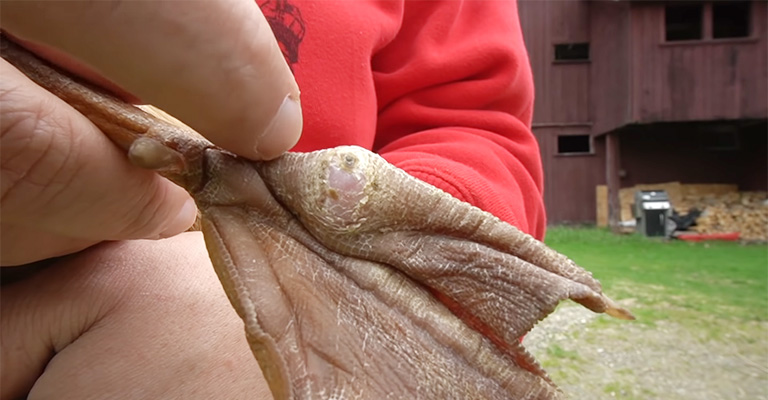
Bumblefoot is a common bacterial infection in the pad of ducks’ feet. It is the second most common reason for limping in ducks.
If you have your ducks on dry ground and in crowds, they will often develop painful abscesses or sores. It will form on the bottom of the footpad and gradually turn into a callus. It is extremely painful and uncomfortable.
Leaving your ducks unattended for too long can become fatal. Fortunately! Treatment is not rare. To take care of bumblefoot, you have to soak the duck’s feet in warm, soapy water. It will soften the area.
Gently remove any scabs or debris. Don’t leave the affected area open. Apply an antibiotic ointment or with a bactericide.
To prevent further spread, you need to be extremely careful and maintain hygiene. Provide them with clean water, and grass and clean the litter too.
As the foot bottom is open, prevent your ducks from walking on any hard surface. Cover any hard surface in case you have to!
3) Lack of Nutrition
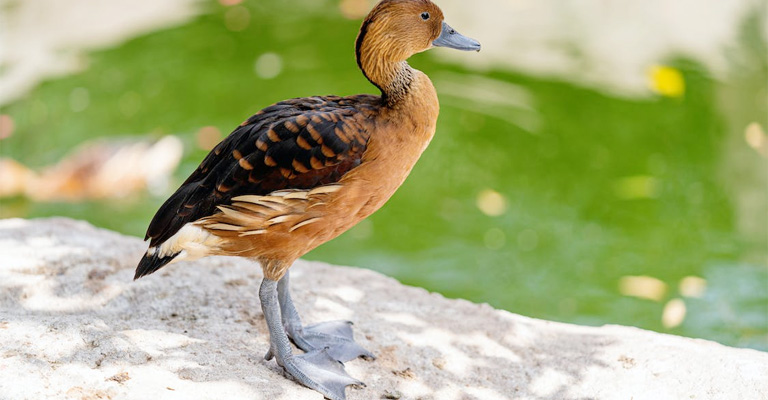
To perform physical functions properly, ducks need a range of vitamins and Niacin is one of them. Niacin is another name for Vitamin B3.
Niacin is essential for ducks and any other living being to convert other nutrient agents like fat, carbs, or protein into usable energy.
Without it, the body even can’t break Vitamin D to strengthen the bones. It can often lead to serious health issues and limping is one of them.
You can skip the chicks but adults need external supplements of Vitamin B3 as they don’t have enough tryptophan to break into energy. Lack of Niacin is another reason why your duck is limping.
Ensure a proper and nutrition-filled diet for your ducks. As suggested by experts, brewer yeast is the ideal source of niacin for ducks.
Sprinkle a bit of brewer’s yeast over the starter pack for ducklings. The ratio is 3 pounds of livestock-grade brewer’s yeast: 25 pounds of starter pack.
Wild ducks can get enough Niacin from nature. Small fishes, worms, and insects are good for that. But poultry ducks and the ones raised in confinement often need additional supplements and you will ensure it.
4) Ducks Get Arthritis
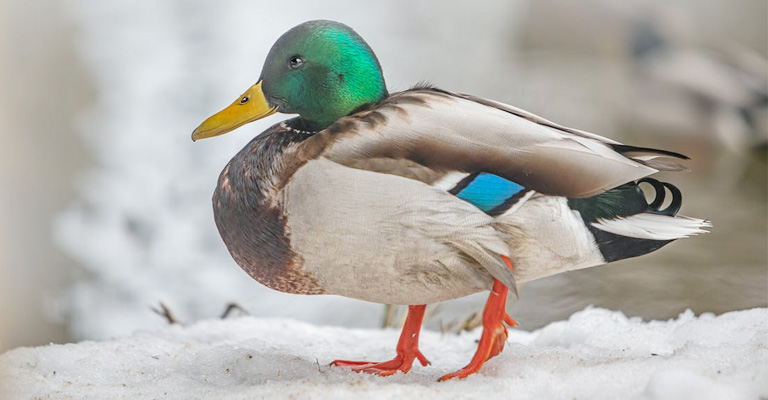
As surprising as it may sound, ducks do get arthritis. This is mostly common in ducks with older age. Ducks with arthritis have a hard time moving and ultimately end up limping.
It is challenging to cure arthritis in ducks and other birds. While it is not entirely curable, you can provide supportive care to minimize the discomfort and pain.
Anti-inflammatory treatments will do the best to treat arthritis in ducks. Talk to your vets and they will prescribe NSAID duck-approved painkillers to keep the ducks out of misery for some time.
You can also ensure easy access to water, food, and a clean comfy place to rest. A little bit of warmth can also reduce the symptoms and keep your duck in comfort.
5) Dehydration

Ducks can often end up with poor dehydration, which is extremely bad! You must be thinking about how dehydration is related to limping.
Dehydration often leads to cracked or dry legs. It will look like the scale is peeling off like fish. There will be no elevation but the affected area will simply go extremely dry. You can feel it when you touch it.
The water needs to be clean. You also need to make sure the ducks can properly wade in water and keep themselves hydrated enough.
Do Ducks Go Lame with Limping Legs?
Limping if not treated and left unattended for too long can lead your ducks to go lame. It is as unfortunate as it may sound, but also the truth.
If you notice your ducks, and ducklings limping and it’s not a one-day recovery, take the right measure before it gets too late. Consider consulting a vet when needed.
Are you seriously bothered by geese around your locality? Here’s just what you need.
In Short,
While different reasons can lead to ducks go limping, you need to identify the cause before it becomes life-threatening.
Ducks may seem sensitive birds and they do honk often! But pay attention at the right time and take the right steps, you can easily avoid any serious casualties. It’s easier this way.
Do you like our article? Let us know in the comment section. Also, don’t forget to share our article with your friends and others. It will raise awareness and also help us grow!